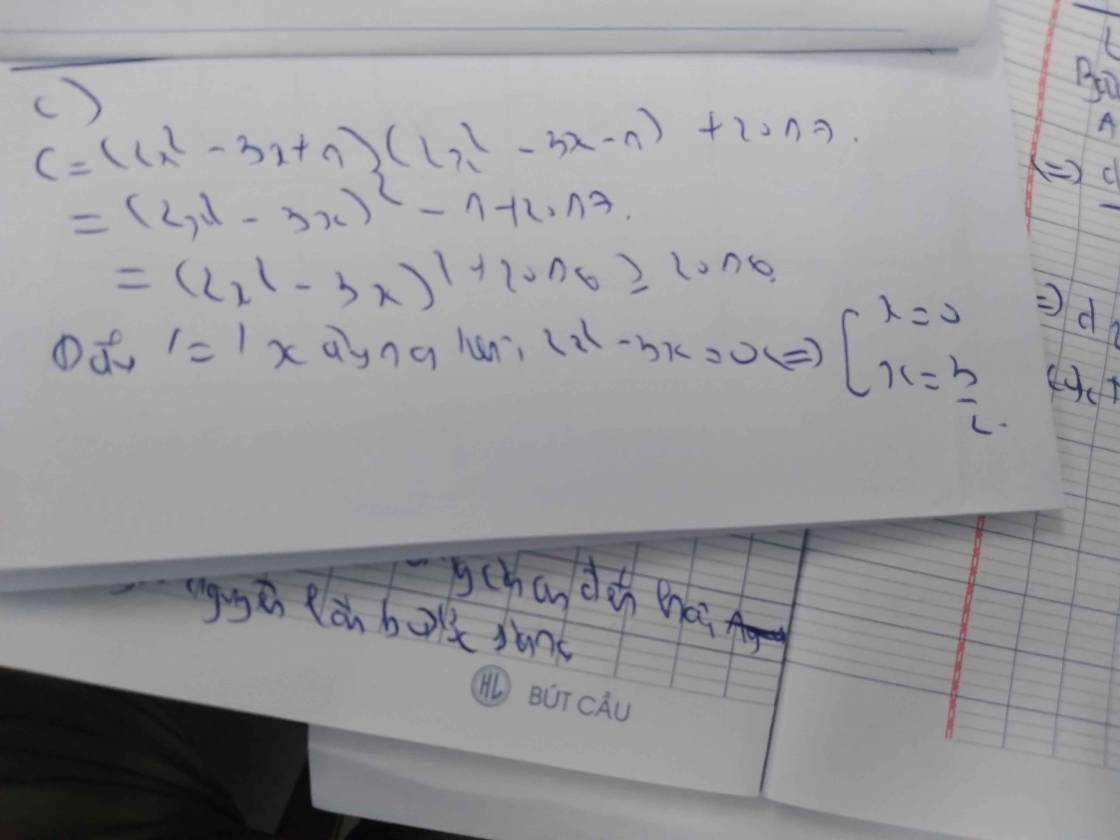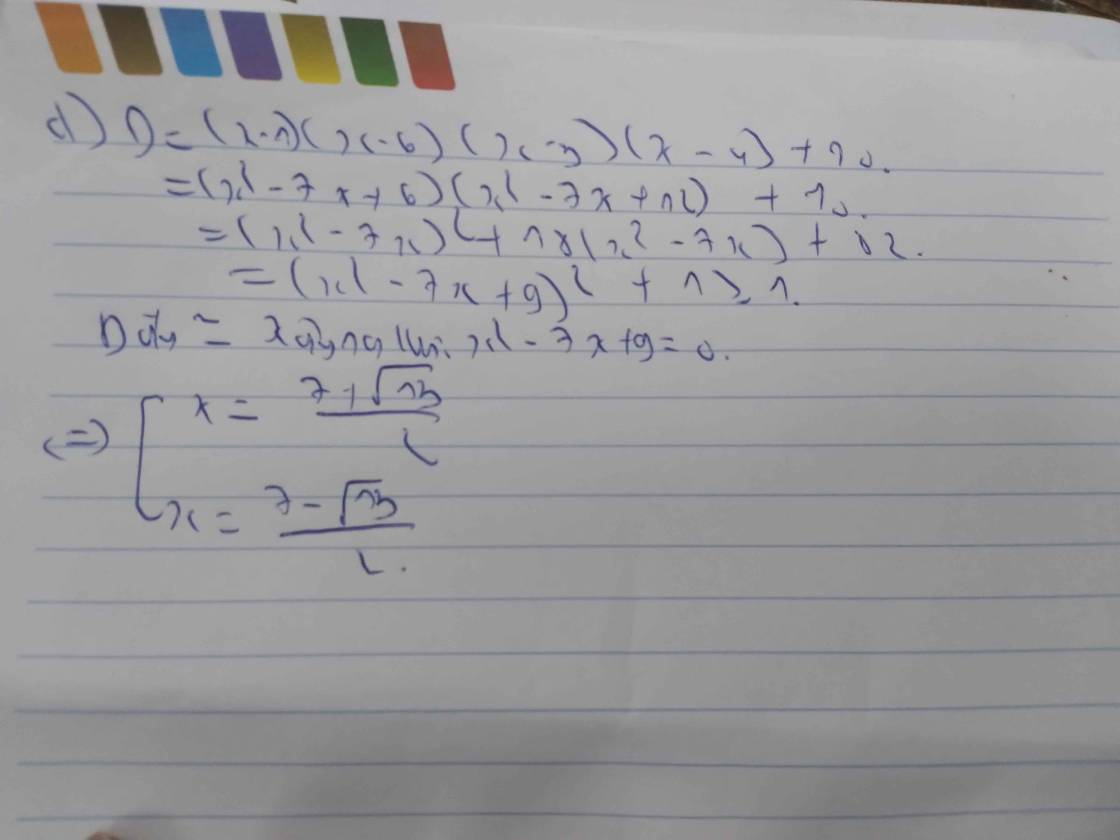Hãy nhập câu hỏi của bạn vào đây, nếu là tài khoản VIP, bạn sẽ được ưu tiên trả lời.

Bạn xem lại đề nhé.
a) \(A=x^2+5y^2+2xy-4x-8y+2015\)
\(A=x^2-4x+4-2y\left(x-2\right)+y^2+2011+4y^2\)
\(A=\left(x-2\right)^2-2y\left(x-2\right)+y^2+2011+4y^2\)
\(A=\left(x-2-y\right)^2+4y^2+2011\)
Vì \(\left(x-y-2\right)^2\ge0;4y^2\ge0\)
\(\Rightarrow A_{min}=2011\)
Dấu bằng xảy ra : \(\Leftrightarrow\left\{{}\begin{matrix}x-y-2=0\\4y^2=0\end{matrix}\right.\Leftrightarrow}\left\{{}\begin{matrix}x=2\\y=0\end{matrix}\right.\)

1. a) $(5-2x)^2-16=0$
$=>(5-2x)^2-4^2=0$
$=>(5-2x-4)(5-2x+4)=0$
$=>(1-2x)(9-2x)=0$
\(=>\left[{}\begin{matrix}1-2x=0=>x=0,5\\9-2x=0=>x=4,5\end{matrix}\right.\)
b) $x^2-4x=29$
$=>x^2-4x-29=0$
$=>(x^2-4x+4)-33=0$
$=>(x-2)^2-(\sqrt{33})^2=0$
$=>(x-2-\sqrt{33})(x-2+\sqrt{33})=0$
\(=>\left[{}\begin{matrix}x-2-\sqrt{33}=0=>x=\sqrt{33}+2\\x-2+\sqrt{33}=0=>x=2-\sqrt{33}\end{matrix}\right.\)
Bài 1:
a) \(\left(5-2x\right)^2-16=0\) (1)
\(\Leftrightarrow\left(5-2x\right)^2=16\)
\(\Leftrightarrow5-2x=\pm4\)
\(\Leftrightarrow\left[{}\begin{matrix}5-2x=4\\5-2x=-4\end{matrix}\right.\)
\(\Leftrightarrow\left[{}\begin{matrix}x=\dfrac{1}{2}\\x=\dfrac{9}{2}\end{matrix}\right.\)
Vậy tập nghiệm phương trình (1) là \(S=\left\{\dfrac{1}{2};\dfrac{9}{2}\right\}\)
b) \(x^2-4x=29\) (2)
\(\Leftrightarrow x^2-4x-29=0\)
\(\Leftrightarrow x=\dfrac{4\pm2\sqrt{33}}{2}\)
\(\Leftrightarrow\left[{}\begin{matrix}x=\dfrac{4+2\sqrt{33}}{2}\\x=\dfrac{4-2\sqrt{33}}{2}\end{matrix}\right.\)
\(\Leftrightarrow\left[{}\begin{matrix}x=2+\sqrt{33}\\x=2-\sqrt{33}\end{matrix}\right.\)
Vậy tập nghiệm phương trình (2) là \(S=\left\{2-\sqrt{33};2+\sqrt{33}\right\}\)
c) \(\left(x-3\right)^3-\left(x-3\right)\left(x^2+3x+9\right)+9\left(x+1\right)^2=15\) (3)
\(\Leftrightarrow x^3-9x^2+27x-27-\left(x^3-27\right)+9\left(x^2+2x+1\right)=15\)
\(\Leftrightarrow x^3-9x^2+27x-27-\left(x^3-27\right)+9x^2+18x+9=15\)
\(\Leftrightarrow x^3+27x-27-x^3+27+18x+9=15\)
\(\Leftrightarrow45x+9=15\)
\(\Leftrightarrow45x=15-9\)
\(\Leftrightarrow45x=6\)
\(\Leftrightarrow x=\dfrac{2}{15}\)
Vậy tập nghiệm phương trình (3) là \(S=\left\{\dfrac{2}{15}\right\}\)
d) \(2\left(x-5\right)\left(x+5\right)-\left(x+2\right)\left(2x-3\right)+x\left(x^2+8\right)=\left(x+1\right)\left(x^2-x+1\right)\)(4)
\(\Leftrightarrow2\left(x^2-25\right)-\left(2x^2-3x+4x-6\right)+x^3-8x=x^3+1\)
\(\Leftrightarrow2x^2-50-\left(2x^2+x-6\right)+x^3-8x=x^3+1\)
\(\Leftrightarrow2x^2-50-2x^2-x+6-8x=1\)
\(\Leftrightarrow-44-9x=1\)
\(\Leftrightarrow-9x=1+45\)
\(\Leftrightarrow-9x=45\)
\(\Leftrightarrow x=-5\)
Vậy tập nghiệm phương trình (4) là \(S=\left\{-5\right\}\)

\(f\left(-1\right)=-4\Rightarrow-1+a-b+c=-4\)
\(\Rightarrow a-b+c=-3\)
\(f\left(2\right)=5\Rightarrow8+4a+2b+c=5\Rightarrow4a+2b+c=-3\)
\(\Rightarrow3a+3b=0\Rightarrow a=-b\)
\(\Rightarrow a^{2019}=-b^{2019}\Rightarrow a^{2019}+b^{2019}=0\)
\(\Rightarrow A=0\)

a) \(\dfrac{1}{\left(a-b\right)\left(b-c\right)}+\dfrac{1}{\left(b-c\right)\left(c-a\right)}+\dfrac{1}{\left(c-a\right)\left(a-b\right)}\)
\(=\dfrac{c-a+a-b+b-c}{\left(a-b\right)\left(b-c\right)\left(c-a\right)}=0\)
b) \(\dfrac{\left(a^2-\left(b+c\right)^2\right)\left(a+b-c\right)}{\left(a+b+c\right)\left(a^2+c^2-2ac-b^2\right)}\)
\(=\dfrac{\left(a-b-c\right)\left(a+b+c\right)\left(a+b-c\right)}{\left(a+b+c\right)\left(\left(a-c\right)^2-b^2\right)}\)
\(=\dfrac{\left(a-c-b\right)\left(a-c+b\right)}{\left(a-c-b\right)\left(a-c+b\right)}=1\)
c) \(\dfrac{x-1}{x^3}-\dfrac{x+1}{x^3-x^2}+\dfrac{3}{x^3-2x^2+x}\)
\(=\dfrac{x-1}{x^3}-\dfrac{x+1}{x^2\left(x-1\right)}+\dfrac{3}{x\left(x-1\right)^2}\)
\(=\dfrac{\left(x-1\right)^3-x\left(x+1\right)\left(x-1\right)+3x^2}{x^3\left(x-1\right)^2}\)
\(=\dfrac{x^3-3x^2+3x-1-x^3+x+3x^2}{x^3\left(x-1\right)^2}\)
\(=\dfrac{4x-1}{x^3\left(x-1\right)^2}\)
d) \(\left(\dfrac{x^2-y^2}{xy}-\dfrac{1}{x+y}\left(\dfrac{x^2}{y}-\dfrac{y^2}{x}\right)\right):\dfrac{x-y}{x}\)
\(=\left(\dfrac{\left(x-y\right)\left(x+y\right)}{xy}-\dfrac{1}{x+y}.\dfrac{x^3-y^3}{xy}\right):\dfrac{x-y}{x}\)
\(=\left(\dfrac{\left(x-y\right)\left(x+y\right)}{xy}-\dfrac{\left(x-y\right)\left(x^2+xy+y^2\right)}{xy\left(x+y\right)}\right):\dfrac{x-y}{x}\)
\(=\dfrac{\left(x-y\right)\left(x^2+2xy+y^2-x^2-xy-y^2\right)}{xy\left(x+y\right)}.\dfrac{x}{x-y}\)
\(=\dfrac{x}{x+y}\)

Bài 1:
a, Ta có:
\(\left(a+b+c\right)^2-\left(ab+bc+ca\right)=0\Leftrightarrow a^2+b^2+c^2+ab+bc+ca=0\)\(\Leftrightarrow2a^2+2b^2+2c^2+2ab+2bc+2ca=0\)
\(\Leftrightarrow\left(a+b\right)^2+\left(b+c\right)^2+\left(c+a\right)^2=0\Leftrightarrow a+b=b+c=c+a=0\)
\(\Leftrightarrow a=b=c=0\)
Vậy điều kiện để phân thức M được xác định là a, b, c không đồng thời = 0
b, Ta có:
\(\left(a+b+c\right)^2=a^2+b^2+c^2+2\left(ab+bc+ca\right)\)
Đặt: \(a^2+b^2+c^2=x,ab+bc+ca=y\)
=> \(\left(a+b+c\right)^2=x+2y\)
Ta cũng có:
\(M=\dfrac{x\left(x+2y\right)+y^2}{x+2y-y}=\dfrac{x^2+2xy+y^2}{x+y}=\dfrac{\left(x+y\right)^2}{x+y}=x+y\)
\(=a^2+b^2+c^2+ab+bc+ca\)

Bài 2 :
a ) \(A=\left(a+b+c\right)^2+a^2+b^2+c^2\)
\(A=a^2+b^2+c^2+2ab+2ac+2bc+a^2+b^2+c^2\)
\(A=\left(a^2+2ab+b^2\right)+\left(a^2+2ac+c^2\right)+\left(b^2+2bc+c^2\right)\)
\(A=\left(a+b\right)^2+\left(a+c\right)^2+\left(b+c\right)^2\)

